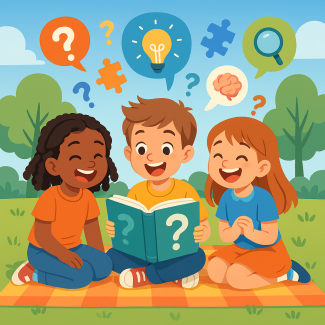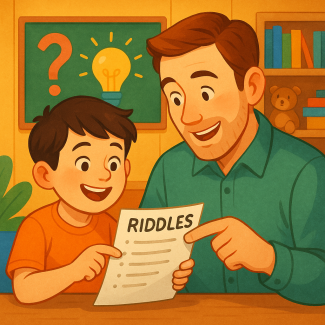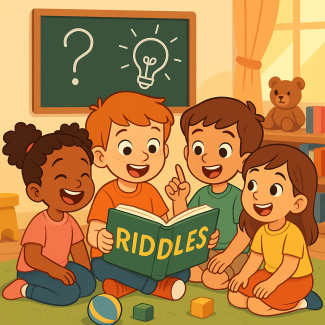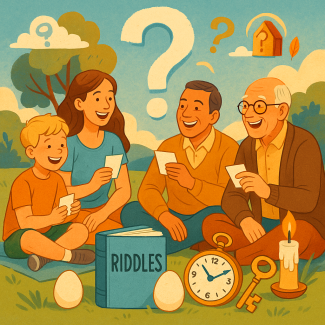Fun and Clever Riddles to Challenge Every Age
What Makes Riddles So Engaging for All Generations?
Riddles have been a part of human culture for centuries, offering both entertainment and mental stimulation. Whether shared around a campfire, in a classroom, or at the dinner table, they serve as a playful way to engage minds, provoke thought, and spark laughter. What makes riddles particularly appealing to both kids and adults is their ability to challenge logic, creativity, and lateral thinking in equal measure.
Benefits of Solving Riddles for Kids and Adults
Solving riddles is more than just a fun pastime. It offers a multitude of benefits for people of all ages:
Mental Stimulation
Riddles activate different areas of the brain, especially those responsible for problem-solving and critical thinking. This kind of mental workout can help sharpen memory and improve cognitive functions.
Language Development
For children, riddles are a great way to build vocabulary, understand puns, and appreciate linguistic nuance. Adults, too, benefit by enhancing verbal reasoning and communication skills.
Stress Relief
Engaging with light-hearted, humorous riddles can serve as an excellent stress-buster, providing a break from routine and allowing the brain to relax while still staying active.
Social Bonding
Riddles promote interaction. Whether shared during family gatherings or in a classroom, they encourage collaborative thinking and laughter, helping to strengthen interpersonal relationships.
Tips for Solving Riddles Like a Pro
Even seasoned riddle lovers occasionally get stumped. Here are a few tips to help you crack the toughest riddles:
Think Outside the Box
Many riddles rely on misdirection. If a question seems too straightforward, it probably is. Try approaching it from a different angle.
Consider Multiple Interpretations
Words can have double meanings, and riddles often exploit this. Be open to interpreting the question in more than one way.
Break It Down
If a riddle seems complicated, dissect it. Focus on one part at a time to reveal clues hidden in the phrasing.
Don’t Rush
Take your time. The best riddle solvers know that patience often leads to insight.
Easy Riddles for Kids to Get Started
What has to be broken before you can use it?
Answer: An egg
I’m tall when I’m young, and I’m short when I’m old. What am I?
Answer: A candle
What has a face and two hands but no arms or legs?
Answer: A clock
What can you catch but not throw?
Answer: A cold
What is full of holes but still holds water?
Answer: A sponge
These riddles are perfect for young minds because they are simple, fun, and rooted in everyday objects.
Intermediate Riddles for Growing Thinkers
The more you take, the more you leave behind. What am I?
Answer: Footsteps
What comes once in a minute, twice in a moment, but never in a thousand years?
Answer: The letter M
What can travel around the world while staying in the same corner?
Answer: A stamp
What gets wetter the more it dries?
Answer: A towel
What has a neck but no head?
Answer: A bottle
These riddles offer a bit more challenge, perfect for older kids or adults looking to keep their brains sharp.
Challenging Riddles for Adults and Puzzle Lovers
I speak without a mouth and hear without ears. I have nobody, but I come alive with the wind. What am I?
Answer: An echo
You measure my life in hours, and I serve you by expiring. I die when I’m devoured. What am I?
Answer: A candle
I have cities but no houses, mountains but no trees, and water but no fish. What am I?
Answer: A map
I’m not alive, but I grow; I don’t have lungs, but I need air; I don’t have a mouth, and yet I drown. What am I?
Answer: Fire
The person who makes it, sells it. The person who buys it never uses it. The person who uses it never knows they’re using it. What is it?
Answer: A coffin
These riddles require critical thinking and abstract reasoning, making them ideal for experienced puzzle solvers.
Riddle Games to Play with Family or Friends
Riddles are even more fun when turned into games. Here are some creative ideas to keep everyone engaged:
Riddle Relay
Create teams. Each team must solve a riddle to move to the next one. The first team to solve all riddles wins.
Mystery Hat
Write riddles on small pieces of paper and place them in a hat. Everyone draws one and reads it aloud. Whoever answers correctly keeps the riddle card.
Timed Riddle Challenge
Set a timer. Each player has 60 seconds to solve a riddle. If they fail, the next player tries. Keep score!
The Educational Value of Riddles in the Classroom
Teachers can use riddles as powerful teaching tools. Here are some advantages:
Enhancing Focus
Students pay more attention when they know a fun riddle is coming up.
Improving Comprehension
Many riddles require understanding the deeper meaning of words, making them great for language arts lessons.
Encouraging Group Work
Group riddle-solving activities promote teamwork and communication.
How to Create Your Own Riddles
Crafting riddles can be just as fun as solving them. Here’s how:
Start with a Simple Concept
Choose a common object or idea, like "shoe" or "mirror."
Think About Unique Traits
What makes the object different or interesting? For example, a mirror reflects but doesn’t speak.
Use Metaphors or Wordplay
Use comparisons or figurative language to describe the object in a mysterious way.
Test on Friends or Family
Try your riddle out and see if others can guess it. Refine based on their feedback.
Famous Riddles in Literature and Pop Culture
Riddles have made appearances in countless stories and films:
The Riddle of the Sphinx
From Greek mythology: "What walks on four legs in the morning, two legs at noon, and three in the evening?"
Answer: A human
Gollum's Riddles in The Hobbit
J.R.R. Tolkien's classic features a tense riddle battle between Bilbo and Gollum.
Batman's Nemesis: The Riddler
This iconic villain from DC Comics uses riddles as his signature calling card.
Riddles from Around the World
Different cultures have their own traditional riddles. Here are a few:
Japanese Riddle
I am a type of room you can eat.
Answer: A mushroom
African Riddle
I have no legs, but I run. I have no voice, but I roar.
Answer: A river
Irish Riddle
What is always in front of you but can’t be seen?
Answer: The future
These international riddles reflect cultural differences in humor, symbolism, and imagination.
Printable Riddle Sheets and Resources
Creating riddle worksheets is a great way to make learning fun. Here are some ideas:
Theme-Based Riddles
Make sheets based on holidays (Halloween, Christmas) or subjects (animals, nature).
Mixed Difficulty Levels
Include easy, medium, and hard riddles to cater to diverse age groups.
Visual Riddles
Add pictures or illustrations for younger children who are just starting to explore language.
Riddle Apps and Online Platforms
In the digital age, riddles have gone online. Here are some popular platforms:
Riddle Me This (App)
Offers daily riddles with a point system for solving.
Braingle.com
A large database of riddles and brain teasers for all difficulty levels.
Riddlewot
This online platform allows you to solve, share, and create your own riddles.
Keep Your Mind Sharp and Your Spirit Playful
Riddles are more than just clever word puzzles. They are a celebration of imagination, intellect, and curiosity. Whether you're a parent, teacher, student, or simply someone who enjoys a good brain teaser, riddles offer an enjoyable way to engage with the world more thoughtfully.
So next time you're looking for something fun and stimulating to do, challenge yourself or others with a few well-chosen riddles. They just might surprise you with how much they can teach—while making you laugh.





